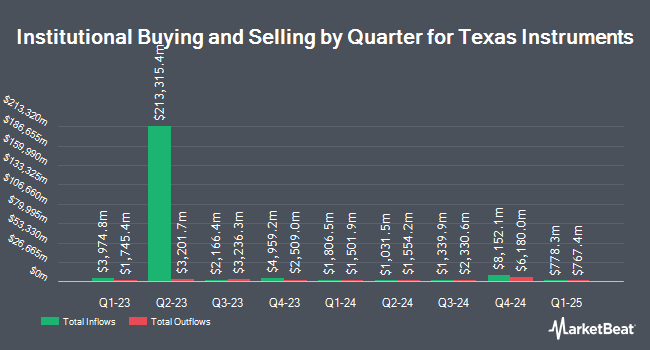Elwood Capital Partners LP acquired a new stake in Texas Instruments Incorporated (NASDAQ:TXN - Free Report) in the 1st quarter, according to the company in its most recent 13F filing with the Securities and Exchange Commission (SEC). The institutional investor acquired 25,184 shares of the semiconductor company's stock, valued at approximately $4,526,000. Texas Instruments makes up about 3.9% of Elwood Capital Partners LP's portfolio, making the stock its 7th largest position.
Several other large investors also recently bought and sold shares of the stock. Trivium Point Advisory LLC grew its stake in shares of Texas Instruments by 4.5% during the 1st quarter. Trivium Point Advisory LLC now owns 1,256 shares of the semiconductor company's stock valued at $226,000 after buying an additional 54 shares during the period. Gerber Kawasaki Wealth & Investment Management grew its stake in shares of Texas Instruments by 1.8% during the 4th quarter. Gerber Kawasaki Wealth & Investment Management now owns 3,187 shares of the semiconductor company's stock valued at $598,000 after buying an additional 56 shares during the period. Trillium Asset Management LLC grew its stake in shares of Texas Instruments by 2.8% during the 1st quarter. Trillium Asset Management LLC now owns 2,100 shares of the semiconductor company's stock valued at $377,000 after buying an additional 57 shares during the period. Voya Financial Advisors Inc. grew its stake in shares of Texas Instruments by 1.6% during the 4th quarter. Voya Financial Advisors Inc. now owns 3,649 shares of the semiconductor company's stock valued at $686,000 after buying an additional 58 shares during the period. Finally, FSB Premier Wealth Management Inc. grew its stake in shares of Texas Instruments by 1.7% during the 1st quarter. FSB Premier Wealth Management Inc. now owns 3,494 shares of the semiconductor company's stock valued at $628,000 after buying an additional 60 shares during the period. Institutional investors and hedge funds own 84.99% of the company's stock.
Texas Instruments Stock Performance
TXN traded down $0.09 on Monday, hitting $205.97. 3,441,639 shares of the company's stock were exchanged, compared to its average volume of 6,426,985. The firm has a market cap of $187.26 billion, a PE ratio of 37.72, a P/E/G ratio of 3.36 and a beta of 1.03. Texas Instruments Incorporated has a twelve month low of $139.95 and a twelve month high of $221.69. The stock has a fifty day moving average of $201.33 and a two-hundred day moving average of $185.95. The company has a current ratio of 5.81, a quick ratio of 3.88 and a debt-to-equity ratio of 0.86.
Texas Instruments (NASDAQ:TXN - Get Free Report) last posted its earnings results on Tuesday, July 22nd. The semiconductor company reported $1.41 EPS for the quarter, topping the consensus estimate of $1.32 by $0.09. Texas Instruments had a net margin of 30.23% and a return on equity of 30.10%. The firm had revenue of $4.45 billion during the quarter, compared to analysts' expectations of $4.31 billion. During the same quarter in the prior year, the firm earned $1.17 EPS. Texas Instruments's quarterly revenue was up 16.4% on a year-over-year basis. Texas Instruments has set its Q3 2025 guidance at 1.360-1.600 EPS. On average, research analysts anticipate that Texas Instruments Incorporated will post 5.35 earnings per share for the current fiscal year.
Texas Instruments Announces Dividend
The company also recently announced a quarterly dividend, which was paid on Tuesday, August 12th. Shareholders of record on Thursday, July 31st were given a $1.36 dividend. The ex-dividend date was Thursday, July 31st. This represents a $5.44 annualized dividend and a yield of 2.6%. Texas Instruments's dividend payout ratio is 99.63%.
Analysts Set New Price Targets
Several analysts have recently issued reports on the stock. UBS Group set a $255.00 price objective on shares of Texas Instruments in a research note on Tuesday, July 22nd. BNP Paribas raised shares of Texas Instruments to a "strong sell" rating in a research note on Wednesday, July 23rd. Susquehanna lowered their price objective on shares of Texas Instruments from $250.00 to $240.00 and set a "positive" rating for the company in a research note on Tuesday, July 22nd. Citigroup reissued a "buy" rating on shares of Texas Instruments in a research note on Tuesday, July 22nd. Finally, Rosenblatt Securities restated a "buy" rating and set a $245.00 target price on shares of Texas Instruments in a report on Wednesday, July 23rd. Two investment analysts have rated the stock with a Strong Buy rating, twelve have given a Buy rating, thirteen have assigned a Hold rating and four have issued a Sell rating to the stock. According to data from MarketBeat.com, the stock presently has a consensus rating of "Hold" and a consensus target price of $212.21.
View Our Latest Report on Texas Instruments
Texas Instruments Profile
(
Free Report)
Texas Instruments Incorporated designs, manufactures, and sells semiconductors to electronics designers and manufacturers in the United States and internationally. The company operates through Analog and Embedded Processing segments. The Analog segment offers power products to manage power requirements across various voltage levels, including battery-management solutions, DC/DC switching regulators, AC/DC and isolated controllers and converters, power switches, linear regulators, voltage references, and lighting products.
Read More

Before you consider Texas Instruments, you'll want to hear this.
MarketBeat keeps track of Wall Street's top-rated and best performing research analysts and the stocks they recommend to their clients on a daily basis. MarketBeat has identified the five stocks that top analysts are quietly whispering to their clients to buy now before the broader market catches on... and Texas Instruments wasn't on the list.
While Texas Instruments currently has a Hold rating among analysts, top-rated analysts believe these five stocks are better buys.
View The Five Stocks Here
Market downturns give many investors pause, and for good reason. Wondering how to offset this risk? Enter your email address to learn more about using beta to protect your portfolio.
Get This Free Report
Like this article? Share it with a colleague.
Link copied to clipboard.